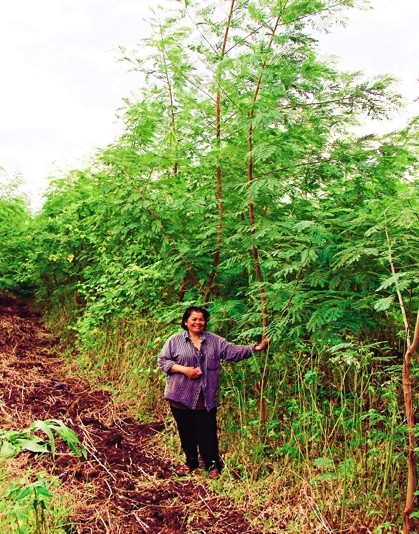
June 2015—Thai farmers are turning away from pesticides and restoring highly degraded land with trees that can live in damaged soil. The trees grow quickly and can thrive in areas where many other species struggle. They require no irrigation and can survive even the driest conditions.
In 2005, a severe drought damaged the entire sugarcane crop of Toom Sumpaoporka and her husband, Manoon. Several years later, they stopped using pesticides and began planting leucaena trees, which provide fuel for clean energy. The trees provide a source of income through the leaves and wood.
“Leucaena trees are like a green gold,” said Toom. “This business allowed us to have a better life with more stable income, while also doing something good for the environment.”
Wood from the tree can be used as pellets for clean energy fuel in power plants. The tree’s leaves make excellent animal feed and improve soil fertility, stimulating growth for other plants while providing another source of income for farmers.
Once planted, the leucaena tree can be harvested annually without re-planting for the next 25 years.
ThaiBiomass, a Bangkok-based biomass trader and manufacturer, contacted Toom in 2012 and encouraged the struggling farmers to plant leucaena instead of sugarcane.
The couple had invested heavily in pesticides, chemical fertilizers and workers for their 50-acre (20-hectare) sugarcane farmland in Lopburi province, Thailand. The excessive use of chemicals further degraded the soil already damaged by the drought, and they were forced to mortgage their land to repay their debts.
In 2014, USAID, through its Private Financing Advisory Network-Asia (PFAN-Asia) program, began helping ThaiBiomass to secure additional investors. The program helps governments and businesses in Asia’s developing countries to secure funding for their clean energy projects.
USAID provided a mentor and support on key elements of the company’s business plan. The company also received an opportunity to present to over 30 potential investors gathered at an annual investor forum held in Singapore.
ThaiBioMass has been actively engaged with local farming communities to raise awareness on the benefits of growing leucaena trees since 2011. It provides training sessions as well as leucaena seed kits to local farmers so they can grow the trees in a sustainable manner. As the company works to expand this success to more local farmers, it improves the livelihoods of its suppliers while securing its own supply of biomass such as wood pellets.
With no expenses now in fertilizers and pesticides, Toom’s 50 acres of leucaena have garnered an annual income of up to $17,000 compared to a net income of $7,800 per year from planting sugarcane in the past. In a few years, she will not only be able to pay off her debts, but will also have the assurance of a more reliable income for years to come.
The PFAN-Asia program, which runs from 2013 to 2018, helps companies pitch their projects to investors and improve their work plans. The program is working to allocate at least $1 billion in funds directly or indirectly for clean energy investments that will avoid or reduce greenhouse gas emissions and increase access to more sustainable clean electricity. The program also helps to create self-sustaining, long-term access to regional clean energy financing.
LINKS
Follow @USAIDAsia, on Facebook, on Flickr, on YouTube







Comment
Make a general inquiry or suggest an improvement.